|
|
|
Sort Order |
|
|
|
Items / Page
|
|
|
|
|
|
|
| Srl | Item |
| 1 |
ID:
122345
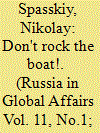

|
|
|
|
|
| Publication |
2013.
|
| Summary/Abstract |
We do not live in an abstract civil society, but in specific economic, legal, cultural, and ideological conditions, with the state as the foundation. When the state falls apart, chaos follows, however briefly. Any chaos is worse than state order, except for rare cases when the government carries out genocide against its own people.
|
|
|
|
|
|
|
|
|
|
|
|
|
|
|
|
| 2 |
ID:
132944
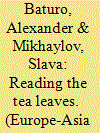

|
|
|
|
|
| Publication |
2014.
|
| Summary/Abstract |
In the absence of public information on the inner workings of the Russian political regime, especially during Medvedev's presidency, outside observers often have to rely on politicians' unguarded comments or subjective analysis. Instead, we turn to quantitative text analysis of political rhetoric. Treating governors as a quasi-expert panel, we argue that policy positions revealed in regional legislative addresses explain how elites perceived the distribution of power between Putin and Medvedev. We find that governors moved from a neutral position in 2009 to a clearly pro-Putin position in 2011, and that policy initiatives advocated by Medvedev all but evaporated from the rhetoric of governors in 2012.
|
|
|
|
|
|
|
|
|
|
|
|
|
|
|
|
| 3 |
ID:
132041
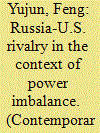

|
|
|
|
|
| Publication |
2014.
|
| Summary/Abstract |
Compared to Soviet-U.S. relations of the Cold War era, contemporary Russia-U.S. relations are less decisively in?uential in shaping the global strategic situation. While evolving, the new relationship between the two sometimes registers dramatic events-Syria and Ukraine, for example-that seem to endanger a proposed "reset" of their bilateral relations. This reset, first mentioned during the presidencies of Dmitry Medvedev in Russia and the first term of Barack Obama in the U.S., was not launched. Since the onset of the global ?nancial crisis, the international strategic situation has further readjusted, and big power relations have remained out of equilibrium. Progress toward improved relations witnessed "apathy" after Vladimir Putin returned to power. Both countries pay less attention to each other in their respective foreign agendas but they are wrestling fiercely in the ?elds of politics, security and geopolitics in spite of an accelerating imbalance of strategic power.
|
|
|
|
|
|
|
|
|
|
|
|
|
|
|
|
| 4 |
ID:
132103
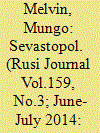

|
|
|
|
|
| Publication |
2014.
|
| Summary/Abstract |
Many saw Russia's annexation of Crimea in March 2014 as a throwback not only to the Cold War, but to earlier memories of Russian imperialist aggression. In such a heated climate, it is essential to understand not only the strategic calculations of contemporary Russia but also its historical, cultural and emotional links to a region that has, for centuries, been at the heart of Russian national identity. Mungo Melvin brings to life this longstanding relationship in a historical, literary and military journey through the birth and struggles of Sevastopol, Crimea's iconic citadel on the Black Sea shores.
|
|
|
|
|
|
|
|
|
|
|
|
|
|
|
|
| 5 |
ID:
133757
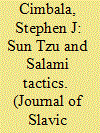

|
|
|
|
|
| Publication |
2014.
|
| Summary/Abstract |
Vladimir Putin used a composite of ancient and modern methods of military persuasion in first destabilizing, and then annexing, Crimea in February and March of 2014. Putin's use of military persuasion through Russian and proxy forces enabled him to annex Crimea and to set the stage for further imposition of Russia's will on Ukraine's eastern provinces. Russia's determination to resist excessive Westernization by Ukraine, especially the possibility of Ukrainian membership in NATO, exceeded the willingness of the U.S. and its allies to reverse Putin's gains in Crimea.
|
|
|
|
|
|
|
|
|
|
|
|
|
|
|
|
| 6 |
ID:
132997
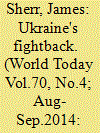

|
|
|
|
|
| Publication |
2014.
|
| Summary/Abstract |
Military manoeuvres took the Kremlin by surprise but the government has a mountain to climb. To those who accept Vladimir Putin's view of Ukraine as an artificial state, the routing of pro-Russian insurgent from their stronghold in Slavyansk on July 5 might have come as a shock. It certainly appears to have surprised the Kremlin.
|
|
|
|
|
|
|
|
|
|
|
|
|
|
|
|
|
|
|
|
|